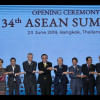We should deepen relations with Malaysia

The visit of Malaysian Prime Minister Anwar bin Ibrahim to Bangladesh was a significant event, as it marked the first visit by a head of state to Bangladesh since the interim government took office. This visit was especially meaningful given the personal friendship between the Malaysian prime minister and Chief Adviser Muhammad Yunus. During their discussions, both leaders expressed a commitment to elevating bilateral relations between the two countries—something that, arguably, should have happened much earlier. Nonetheless, with the recent change in government in Bangladesh and the Malaysian prime minister's visit, a new chapter in our relationship has hopefully begun.
Prime Minister Ibrahim pledged to consider allowing the entry of 18,000 Bangladeshi workers who were unable to enter Malaysia in May, which is already a positive step forward. Given the current state of the two countries, there is great potential for mutually beneficial cooperation, starting with the issue of labour migration. The prime minister acknowledged that Malaysia needs workers, a need that Bangladesh is well-positioned to meet. And now is the ideal time for both countries to address the flaws and exploitation that have negatively affected this issue, particularly for Bangladeshi migrant workers. As the prime minister rightly noted, although Malaysia needs workers, they must not be treated as modern-day slaves. Therefore, it is crucial to eliminate the corruption caused by recruitment syndicates involving Bangladeshi and Malaysian nationals and loopholes in the system that allow for the mistreatment of workers, causing harm and losses for both nations. The two countries should deeply examine how labour migration can be made safer and more beneficial for both, and perhaps, set a standard for global labour migration as a whole.
Apart from being an important labour destination, Malaysia is also a popular choice for many Bangladeshi students pursuing higher education. And this is another area where the two countries should enhance collaboration. Additionally, Malaysia could become a destination for Bangladeshis seeking medical treatment if travel visa procedures are simplified between the two countries. We believe that Bangladesh should seek greater economic integration with Malaysia, and pursue technology and knowledge transfer from it to accelerate our country's development—similar to what Malaysia has previously achieved. We also hope that our Malaysian partners will be open to providing such assistance to Bangladesh.
Finally, as Prof Yunus has pointed out, Malaysia is well-positioned to appeal to Asean to increase efforts in helping Bangladesh resolve the Rohingya crisis, which poses a risk to the region's overall stability. Given Malaysia's chairmanship of Asean in January 2025, we hope the country will bring this issue to the other members' attention, as well as the matter of Bangladesh's inclusion as a sectoral dialogue partner within the union.


 For all latest news, follow The Daily Star's Google News channel.
For all latest news, follow The Daily Star's Google News channel. 









Comments